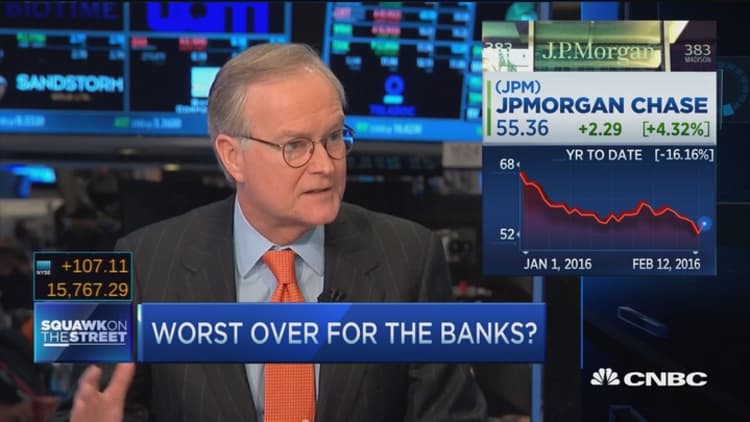
One analyst believes that the market is too skittish and sees a buying opportunity in the financials, which is the worst performing sector in the S&P year-to-date, down more than 15 percent according to FactSet.
Drexel Hamilton bank analyst David Hilder told CNBC's "Squawk on the Street" that the market should not draw comparisons between the U.S. and European banks.
"European banks are in much worse shape. Their commercial nonperforming loans are 10 times what you see in the U.S. banks. Overall, nonperforming assets in Europe are five times what you see in the U.S.," Hilder said.
Despite the panic over the possibility of negative interest rates in the United States, Hilder isn't that worried. He points out that the banks are currently getting 50 basis points on their reserves at the Fed, which is higher than the 25 basis points they had been getting prior to December 15th.
"If it goes to negative 25 (basis points), that's not a very big impact on the banks' income statements," Hilder said.
"The real damage that negative interest rates have on the economy is that it's a negative signal. If central banks are going to negative interest rates, that's a negative signal about their economies," he added.
Hilder concluded that he doesn't recommend negative interest rate policy and that he also doesn't think it would work in the U.S.

On Thursday, CEO of JPMorgan Chase Jamie Dimon bought 500,000 shares of his company's stock, valued over $25 million. Hilder noted that although JPMorgan is currently trading at a roughly 10 percent premium to its tangible book value, Dimon has a track record of buying his company's stock at opportune times.
Hilder said that most major U.S. banks like Citi and Bank of America are trading below their tangible book values.
"The large bank stocks are incredibly cheap ... the banks are all very well capitalized and well reserved," said Hilder.
Disclosure: Bank of America, JPMorgan Chase and Citigroup are investment banking clients of Drexel Hamilton.




